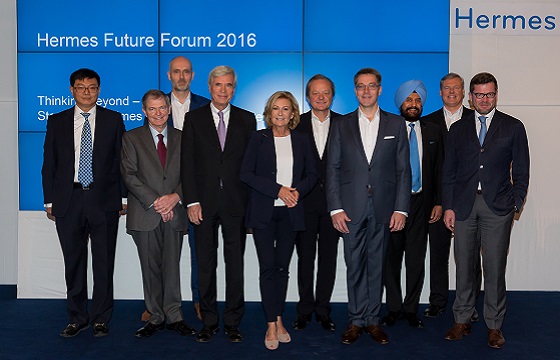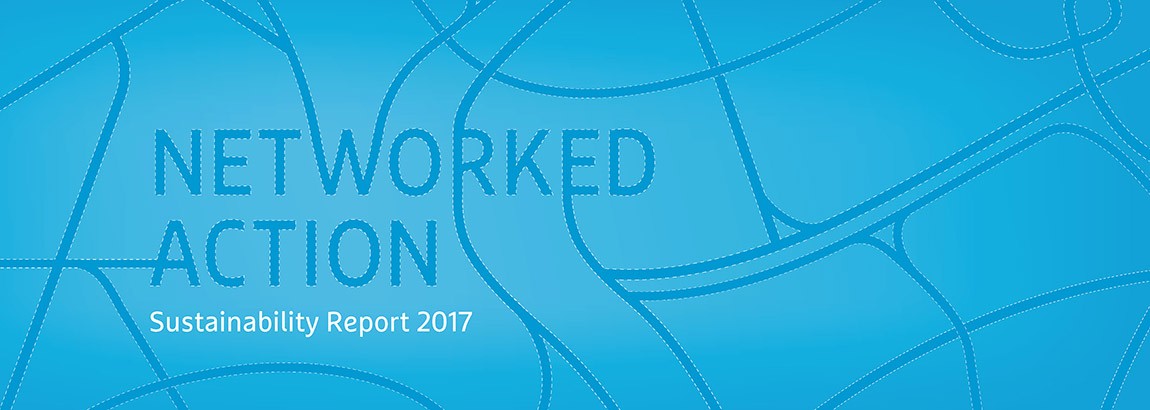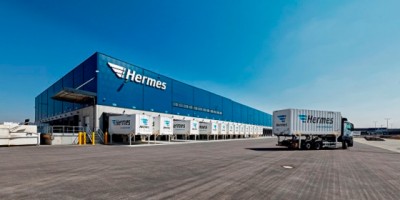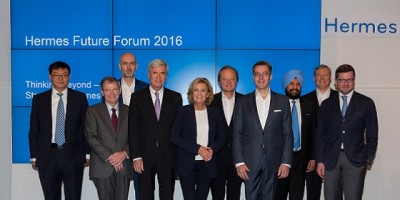Best cases
Dialogue with stakeholders: Projects from the Hermes world
Hermes Future Forum
Through its Hermes Future Forum, Hermes created its own platform in 2010 to discuss the future of corporate responsibility. The event, which takes place every two years, is intended to provide lasting impetus and provide managers with perspectives for corporate practice, highlighting in particular the global responsibility of companies in increasingly complex social and political contexts.

Dr. Michael Otto, Sabine Christiansen, Hanjo Schneider, Alexander Birken,
Satjiv Chahil, Hartmut Jenner, Karl-Theodor zu Guttenberg. (Photo: Hermes)
In 2010, Prof. Muhammad Yunus, who was awarded the Nobel Peace Prize for the invention of microcredits, was among those present as was Dr Kofi Annan, who launched the Global Compact initiative during his time as UN Secretary General.
In 2012, Jeremy Rifkin, for example, author of books such as ‘The Third Industrial Revolution’ and president of the Foundation on Economic Trends, spoke about the curse and blessing of the economy persevering with growth. Olin Liu, Chief Economist of China International Capital Corporation Ltd. explained her view of the euro crisis and national debt.
The third Hermes Future Forum in 2014 focused on the future of innovation - as usual, Dan Cobley, former Managing Director of Google, Kate Kui, Vice President of the Chinese online retail giant JD.com, Frederik Willem de Klerk, former President of South Africa and Nobel Peace Prize winner together with Nelson Mandela in 1993 discussed pertinent issues in a somewhat unconventional manner.
In 2016, Hermes staged its Hermes Future Forum for the fourth time in Hamburg, under the title: “Thinking Beyond – strategies in times of disruptive change“. Hermes was once again able to win top-class guests from business, politics and science, including Satjiv Chahil (former HP and Apple), Joschka Fischer (former German Foreign Minister), Christoph Keese (Axel Springer), Hartmut Jenner (Kärcher GmbH & Co.KG) and Myron E. Ullmann (former J.C. Penney). They discussed possible scenarios and effective strategies for the future with hosts Hermes and the Otto Group as well as with Olaf Scholz, then First Mayor of the City of Hamburg.
With its four events to date, the high-quality and exclusive Hermes Future Forum has proven itself as a top conference for decision-makers - but also as a further component of Hermes' long-term sustainability efforts.
DCTI study: Conscious shopping – with an eye on the environment
Online shopping or over-the-counter retail: what is the more climate-friendly way to shop? For a long time there were plenty of opinions and assumptions, but no well-founded answer to this question. And given their drive to minimise the negative effects of booming online trade on their environment, particularly with regard to climate protection, both the Otto Group and Hermes also had a vested interest in reliable facts. Against this background, therefore, the renowned German Clean Tech Institute (DCTI) was commissioned in 2015 to carry out an independent study on the carbon footprint of the two shopping channels.
In the comparative study of online and over-the-counter retail, the DCTI took into account of the purchasing behaviour of different types of buyers as well as various product categories from books to furniture. The surprisingly clear result of its findings was that online retail puts no more strain on the environment than over-the-counter retail. Transporting goods directly from the retailer to the customer is even more efficient and emits less climate-damaging gas - even taking into account the returns that for many are part of the e-commerce system.
However, the aim of the study was explicitly not to select a type of trade as the supposedly correct choice. Instead, the Otto Group and Hermes used the results to deliberately encourage the relevant players - customers, retailers and logistics service providers - to take a closer look at this carbon footprint as part of the shopping process. Customers are enabled to make a conscious and informed decision based on the results. Retailers - both over-the counter and online traders - can derive recommendations for sustainable mobility concepts and logistics service providers can also identify starting points for making their operational processes even more climate-friendly and sustainable.





